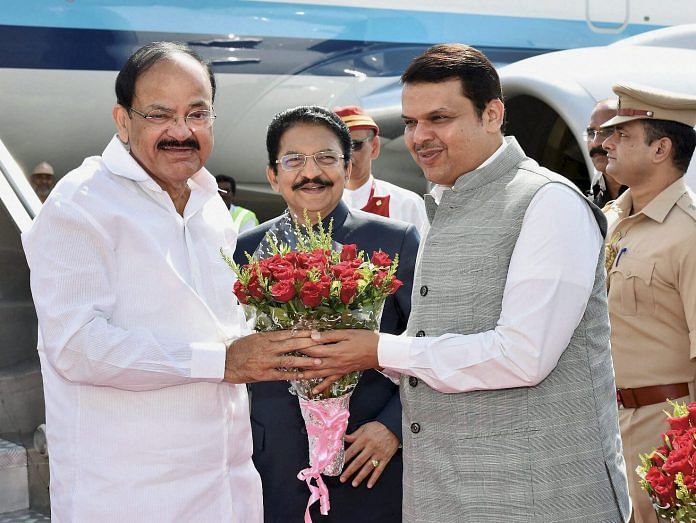The BJP rode to power in Maharashtra three years ago, getting a chance to govern the state after 15 years with Devendra Fadnavis at the helm. The chief minister promised clean, transparent governance, more industrialisation and employment opportunities, improving the state’s finances and ramping up infrastructure. However, his tenure has grappled with an acute agrarian distress and a farm loan waiver, dwindling finances, slow investment, and corruption charges.
As the Devendra Fadnavis government completes three years in office, has it lived up to its promises?
The BJP promised clean governance, but a large number of Fadnavis’ ministers are facing serious corruption charges.
 Prithviraj Chavan
Prithviraj Chavan
Former CM and Congress MLA
The Devendra Fadnavis government has a decisive mandate, unlike the Congress-NCP government, which was a coalition of two almost equal partners. All the power is virtually with the CM. Despite this, he has wasted a great opportunity.
Maharashtra’s position as the number one economy in the country is clearly slipping. During the ‘Make in Maharashtra’ event last year, the state government promised Rs 8 lakh crore worth of foreign investment that would create 30 lakh new jobs. But the ground reality is that no major industry has come, and no new jobs have been created. It is naive to expect that you visit abroad, shake a few hands, and investment will follow. Actually, Maharashtra’s ‘Ease of Doing Business’ ranking is pretty dismal.
The CM keeps on blaming the bureaucracy. But the civil service is demoralised. This is apparent from the many frequent and completely random transfers. The wrong people are placed in sensitive jobs. The BJP promised clean governance, but a large number of Fadnavis’s ministers are facing serious corruption charges.
There is dire distress in the agriculture sector – with two consecutive droughts, followed by the man-made disaster of demonetisation. BJP leaders made tall pre-poll promises to farmers – about complete loan write-offs, remunerative prices based on the Swaminathan Commission’s recommendations, and doubling farmers’ income in five years, but they have not delivered on any promise. Incidents of farmers committing suicide over the last three years have been the highest. They have now completely messed up the farm debt relief. This has been an anti-farmer government on every count.
Demonetisation and the faulty implementation of GST have caused a major slowdown in the economy. Even traders are up in the arms. But the government seems to have lost touch with reality. It is happy to make announcements, issue massive advertisements, and organise large events.
Maharashtra government’s performance is a five on ten in planning, a three on ten in implementation.
 Neelam Gorhe
Neelam Gorhe
Shiv Sena leader and MLC
So far, the Maharashtra government’s performance is a five on ten in planning, and a three on ten in implementation. There is a lack of perspective and core understanding of issues. The CM himself is very intelligent and visionary, but there is a huge gap between him and his colleagues that hampers performance.
The government has made a good beginning in strengthening social infrastructure, especially improving pilgrimage places. The public works department has worked on improving amenities along highways, aiming for special toilets for women. Having a gender-responsive budget too is a good step, but the government needs to have a methodical approach to it.
Being a lawyer, the CM has an excellent understanding of the Home department and sensitivity. The system still has lacunae that need improvement. One of his greatest achievements has been the improvement in conviction rate to more than 30-40 per cent from the earlier figure of 3-5 per cent.
The CM is often unfairly targeted, even by his own party leaders, because he belongs to a particular community. Overall, the social atmosphere of Maharashtra, known to be a progressive state, has become muddy. Issues such as cattle slaughter, vegetarianism, and controlling individual life choices have unfortunately become a part of the national Hindutva discourse, and the CM has to carry their weight in Maharashtra too.
In three years, the Shiv Sena has constantly tried to give good suggestions that the government has implemented, such as compensation to local bodies on the introduction of the Goods and Services Tax (GST), allowing shops and establishments to be open 24/7. Most importantly, it is because of the Shiv Sena that the BJP’s keenness for a separate Vidarbha has taken a backseat.
Overall, the government’s three biggest achievements have been the Jalyukt Shivar scheme to improve moisture in soil, an increase in the conviction rate, and focus on improving the state’s roads. The three biggest failures are the inability to control farmer suicides, the chaos in education, and a deteriorating rationing system.
Electoral success in gram panchayats to municipalities is a testimony to the people’s support for our work in Maharashtra.
 Ashish Shelar
Ashish Shelar
MLA and Mumbai BJP President
It was 1,096 days ago that the Devendra Fadnavis-led BJP government took charge of Maharashtra’s affairs, in the midst of an all-round crisis and public discontent. But we drew courage and strength from the overwhelming public mandate in our favour.
Back then, we faced daily questions on the stability and even the survival of our government. But we were unfazed, as Maharashtra’s towns /cities were plagued by broken infrastructure, stalled projects, and paralysed civic administration. The rural sector was facing the worst drought since 1972-73, the impact amplified by the previous government’s skewed policies, leading to regional imbalances and non-existent irrigation infrastructure. To top it off, the state government was saddled with a Rs 3 lakh crore debt, and an empty treasury.
Three years on, things have changed dramatically, and Maharashtra is firmly set on path of all round development.
On the infrastructure front, projects like ‘Make in Maharashtra’, 300 kilometres of Metro train services in Mumbai, Pune, and Nagpur, the Samruddhi expressway corridor, the Navi Mumbai airport, the trans-harbour link, the JNPT SEZ, dry ports for Marathwada and Vidarbha, Pune’s smart city and its new airport are on schedule. Small town connectivity is being boosted through new airports and highways. The regional imbalance is being corrected through an unprecedented Rs 4.5 lakh crore worth of projects sanctioned for the Marathwada and Vidarbha regions.
On the agrarian front, schemes like Jalyukt Shivar, the focus on irrigation infrastructure, the ‘farm to fork’ initiative, APMC liberalisation, water management, crop insurance, and a Rs 34,000 crore farm loan waiver with two good monsoons have helped reverse the decline, and put the farm sector on the growth path.
On the administrative front, a no-nonsense policy-driven time-bound approach, zero tolerance to corruption, Right to Services Act, ‘Aaple Sarkar’, streamlining of civic systems, and the implementation of the housing regulator have enhanced the effectiveness of the government’s policies and interventions.
The continued electoral success of our party (from gram panchayats to municipalities) is testimony to the wholehearted backing Maharashtra’s populace is giving us.
Bolstered by this mandate, our government is now focused on implementing our pro-people development agenda over the next 10 years.
When the BJP took over the reins, it set itself up for over-expectation, promising sweeping changes in the way the government functions.
 Manasi Phadke
Manasi Phadke
Associate Editor, ThePrint
When the BJP took over the reins, it set itself up for over-expectation, promising sweeping changes in the way the government functions, bringing in a new era of transparency and zero corruption, cutting red tape, rejuvenating urban Maharashtra, and projecting Devendra Fadnavis as a young, dynamic CM with vision and zeal, and PM Narendra Modi as a near magician.
In that context, the government’s performance has been a mixed bag.
One of the government’s greatest achievements has been to streamline approvals and bring in a single window for clearance in a variety of sectors – industries, construction, hotels, film shoots. Most processes are now online, with clear time limits. However, it has not completely eliminated bureaucratic red tape. For instance, several developers still complain off the record that their files are rejected online for frivolous reasons. However, the process is still several shades better than what it used to be.
As promised, the CM implemented the Right to Services Act for delivery of time-bound services to citizens, though activists lament the government’s inability to bring all services that it provides under the Act’s ambit, even three years down the line. The government also scrapped a number of unnecessary toll levies, a long-standing public demand.
The CM’s ‘war room’ for infrastructure, bringing all departments on one platform and making them directly accountable to the CMO, has helped eliminate multiple procedural hurdles that infrastructure projects had to otherwise tackle.
Despite this, the implementation of many projects has not been as quick as the government earlier projected. Three years on, the construction of some key projects such as Mumbai’s trans-harbour link and a coastal road are yet to take off. The grand ‘housing for all’ scheme is lagging far behind targets, and some bureaucrats themselves admit that the smart cities scheme is doing little to bring about the overhaul that cities really need.
What stands out is the government’s complete failure to live up to its projection as a clean, corruption-free administration. Half the ministers are battling graft charges, one had to resign within the first two years, and the party’s willingness to induct tainted politicians further weakens its ‘clean governance’ premise.




The general economic slowdown, now about five years old, and increasing fiscal stress for the states, after a period of consolidation, are the backdrop against which the performance of state governments needs to be evaluated. For Maharashtra and especially for the Mumbai Metropolitan Region, which could be India’s Shenzhen, the extreme pain being felt by the real estate sector is an added drag. Geography and geology conspire to limit the state’s irrigation potential. The young, dynamic CM has many battles to fight.